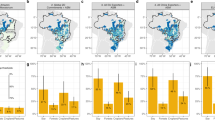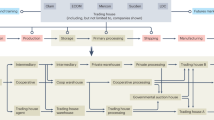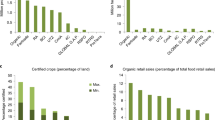Abstract
A major reduction in global deforestation is needed to mitigate climate change and biodiversity loss. Recent private sector commitments aim to eliminate deforestation from a company’s operations or supply chain, but they fall short on several fronts. Company pledges vary in the degree to which they include time-bound interventions with clear definitions and criteria to achieve verifiable outcomes. Zero-deforestation policies by companies may be insufficient to achieve broader impact on their own due to leakage, lack of transparency and traceability, selective adoption and smallholder marginalization. Public–private policy mixes are needed to increase the effectiveness of supply-chain initiatives that aim to reduce deforestation. We review current supply-chain initiatives, their effectiveness, and the challenges they face, and go on to identify knowledge gaps for complementary public–private policies.
This is a preview of subscription content, access via your institution
Access options
Access Nature and 54 other Nature Portfolio journals
Get Nature+, our best-value online-access subscription
$29.99 / 30 days
cancel any time
Subscribe to this journal
Receive 12 print issues and online access
$209.00 per year
only $17.42 per issue
Buy this article
- Purchase on Springer Link
- Instant access to full article PDF
Prices may be subject to local taxes which are calculated during checkout
Similar content being viewed by others
References
Donofrio, B., Rothrock, P. & Leonard, J. Supply-change: Tracking Corporate Commitments to Deforestation-free Supply Chains (Forest Trends, 2017).
Baron, D. P. Private politics, corporate social responsibility, and integrated strategy. J. Econ. Manag. Strateg. 10, 7–45 (2001).
Lyon, T. P. & Maxwell, J. W. Corporate social responsibility and the environment: A theoretical perspective. Rev. Environ. Econ. Policy 2, 240–260 (2008).
Alves, I. M. Green spin everywhere: How greenwashing reveals the limits of the CSR paradigm. J. Glob. Change Gov. 2, 1–26 (2009).
Elder, S. D., Lister, J. & Dauvergne, P. Big retail and sustainable coffee: A new development studies research agenda. Prog. Dev. Stud. 14, 77–90 (2014).
Oliveira, L. J. C., Costa, M. H., Soares-Filho, B. S. & Coe, M. T. Large-scale expansion of agriculture in Amazonia may be a no-win scenario. Environ. Res. Lett. 8, 024021 (2013).
Progress on the New York Declaration on Forests: Eliminating Deforestation from the Production of Agricultural Commodities—Goal 2 Assessment Report (Climate Focus, 2016).
Forests: Action Statements and Action Plans (United Nations, 2014); http://go.nature.com/2mAjBIt
Lambin, E. F. et al. Effectiveness and synergies of policy instruments for land use governance in tropical regions. Glob. Environ. Change 28, 129–140 (2014).
Fuchs, D., Kalfagianni, A. & Havinga, T. Actors in private food governance: The legitimacy of retail standards and multistakeholder initiatives with civil society participation. Agr. Hum. Values 28, 353–367 (2011).
Rueda, X., Garrett, R. D. & Lambin, E. F. Corporate investments in supply chain sustainability: Selecting instruments in the agri-food industry. J. Cleaner Prod. 142, 2480–2492 (2016).
Brown, S. & Zarin, D. What does zero deforestation mean? Science 342, 805–807 (2013).
Deforestation: Mobilizing Resources to Help Achieve Zero Net Deforestation by 2020 (Consumer Goods Forum, 2010); http://go.nature.com/2Dfji02
Sleeping Giants of Deforestation: The Companies, Countries and Financial Institutions with the Power to Save Forests (Global Canopy Programme, 2016).
Auld, G., Gulbrandsen, L. H. & McDermott, C. L. Certification schemes and the impacts on forests and forestry. Ann. Rev. Environ. Res. 33, 187–211 (2008).
Milder, J. et al. An agenda for assessing and improving conservation impacts of sustainability standards in tropical agriculture. Conserv. Biol. 29, 309–320 (2014).
Peters-Stanley, M., Donofrio, S. & McCarthy, B. Supply-change: Corporations, Commodities, and Commitments that Count (Forest Trends, 2015).
National Commitments (Roundtable on Sustainable Palm Oil, 2016); http://go.nature.com/2mx6UOu
Task Force Sustainable Palm Oil: Final Report 2015 (Task Force Sustainable Palm Oil, 2015); http://go.nature.com/2DbWork
Gibbs, H. K. et al. Brazil’s soy moratorium: Supply chain governance is needed to avoid deforestation. Science 347, 377–378 (2015).
Gibbs, H. K. et al. Did ranchers and slaughterhouses respond to zero-deforestation agreements in the Brazilian Amazon? Conserv. Lett. 9, 32–42 (2015).
Heilmayr, R. & Lambin, E. F. Impacts of nonstate, market-driven governance on Chilean forests. Proc. Natl Acad. Sci. USA 113, 2910–2915 (2016).
Cargill Policy on Forests (Cargill, 2015); http://go.nature.com/2DhMpQl
Cargill Forest Protection Action Plans (Cargill, 2015); http://go.nature.com/2mAHzDB
Watson, S. & Mullet Solon, M. Slow Road to Sustainability (WWF, 2016).
Bregman, T. P., McCoy, K., Servent, R. & MacFarquhar, C. Turning Collective Commitment into Action: Assessing Progress by Consumer Goods Forum Members towards Achieving Deforestation-free Supply Chains (Global Canopy Programme, 2016).
Greening Global Supply Chains: From Blind Spots to Hot Spots to Action (The Sustainability Consortium, 2016).
Beghin, J. C., Maertens, M. & Swinnen, J. Nontariff measures and standards in trade and global value chains. Ann. Rev. Res. Econ. 7, 425–50 (2015).
Ruben, R. & Zuniga, G. How standards compete: comparative impact of coffee certification schemes in Northern Nicaragua. Supply Chain Manag. Int. J. 16, 98–109 (2011).
Darnall, N. & Sides, S. Assessing the performance of voluntary environmental programs: Does certification matter? Policy Stud. J. 36, 95–117 (2008).
Khanna, M. & Brouhle, K. in Governance for the Environment (eds Delmas, M. & Young, O.) Ch. 6 144–182 (Cambridge Univ. Press, New York, 2009).
Locke, R. M. The Promise and Limits of Private Power: Promoting Labor Standards in a Global Economy (Cambridge Univ. Press, New York, 2013).
Barrientos, S. & Smith, S. Do workers benefit from ethical trade? Assessing codes of labour practice in global production systems. Third World Quart. 28, 713–729 (2007).
Doremus, J. M. Three Essays on the Effectiveness of Voluntary Forest Certification. PhD thesis, Univ. Michigan (2015).
Defries, R. S., Fanzo, J., Mondal, P., Remans, R. & Wood, S. A. Is voluntary certification of tropical agricultural commodities achieving sustainability goals for small-scale producers? A review of the evidence. Environ. Res. Lett. 12, 1–11 (2017).
Oya, C., Schaefer, F., Skalidou, D., McCosker, C. & Langer, L. Effects of certification schemes for agricultural production on socio-economic outcomes in low- and middle- income countries: A systematic review. Campbell Syst. Rev. http://doi.org/ch9c (2017).
Rueda, X., Thomas, N. & Lambin, E. F. Eco-certification and coffee cultivation enhance tree cover in the Colombian coffee landscapes. Reg. Environ. Change 15, 25–33 (2014).
Blackman, A., Goff, L. & Rivera Planter, M. Does Eco-certification Stem Tropical Deforestation? Discussion Paper 15-36 (Resources for the Future, 2015).
Panlasigui, S., Rico-Straffon, J., Swenson, J., Loucks, C. J. & Pfaff, A. Early Days in the Certification of Logging Concessions: Estimating FSC’s Deforestation Impact in Peru and Cameroon Working Paper EE 15–05 (Duke Environmental and Energy Economics Working Paper Series, Duke University, 2015).
Miteva, D. A., Loucks, C. J. & Pattanayak, S. K. Social and environmental impacts of forest management certification in Indonesia. PLoS ONE 10, e0129675 (2015).
Carlson, K. M. et al. Effect of oil palm sustainability certification on deforestation and fire in Indonesia. Proc. Natl Acad. Sci. USA 115, 121–126 (2018).
Cattau, M. E., Marlier, M. E. & DeFries, R. S. Effectiveness of Roundtable on Sustainable Palm Oil (RSPO) for reducing fires on oil palm concessions in Indonesia from 2012 to 2015. Environ. Res. Lett. 11, 105007 (2016).
Macedo, M. N. et al. Decoupling of deforestation and soy production in the southern Amazon during the late 2000s. Proc. Natl Acad. Sci. USA 109, 1341–1346 (2012).
Alix-Garcia, J. & Gibbs, H. K. Forest conservation effects of Brazil’s zero deforestation agreements undermined by leakage. Glob. Environ. Change 47, 201–217 (2017).
Delmas, M. A. & Burbano, V. C. The drivers of greenwashing. Calif. Manage. Rev. 54, 64–87 (2011).
Tinoco, J., Boi clandestino não morre de velho. ( (o))eco (7 December 2016); http://go.nature.com/2D4rw7H
Rausch, L. R. & Gibbs, H. K. Property arrangements and soy production in the Brazilian state of Mato Grosso: Implications for supply chain governance. Land 5, 7 (2016).
le Polain de Waroux, Y., Garrett, R., Heilmayr, R. & Lambin, E. F. Land use policies and corporate investments in agriculture in the Gran Chaco and Chiquitano. Proc. Natl Acad. Sci. USA 113, 4021–4026 (2016).
le Polain de Waroux, Y., Garrett, R., Graesser, J., Nolte, C. & Lambin, E. F. Deforestation leakage for soy and cattle across South American biomes. World Dev. http://doi.org/ch9f (2017).
Garrett, R. D., Carlson, K. M., Rueda, X. & Noojipady, P. Assessing the potential additionality of certification by the Round Table on Responsible Soybeans and the Roundtable on Sustainable Palm Oil. Environ. Res. Lett. 11, 45003 (2016).
Rietberg, P. & Slingerland, M. Barriers to RSPO Smallholder Certification (SEnSOR Programme, 2016); http://go.nature.com/2DhpnsM
Winters, P. et al. Voluntary certification design choices influence producer participation, stakeholder acceptance, and environmental sustainability in commodity agriculture sectors in tropical forest landscapes. J. Sust. Forest. 34, 581–604 (2015).
Bush, S. R. et al. Global food supply: Certify sustainable aquaculture? Science 341, 1067–1068 (2013).
Garrett, R. D., Rueda, X. & Lambin, E. F. Globalization’s unexpected impact on soybean production in South America: Linkages between preferences for non-genetically modified crops, eco-certifications, and land use. Environ. Res. Lett. 8, 44055 (2013).
Bacon, C. Confronting the coffee crisis: Can Fair Trade, organic, and specialty coffees reduce small-scale farmer vulnerability in northern Nicaragua? World Dev. 33, 497–511 (2005).
Lee, J. S. H. et al. Environmental impacts of large-scale oil palm enterprises exceed that of smallholdings in Indonesia. Conserv. Lett. 7, 25–33 (2014).
Godar, J., Gardner, T. A., Tizado, E. J. & Pacheco, P. Actor-specific contributions to the deforestation slowdown in the Brazilian Amazon. Proc. Natl Acad. Sci. USA 111, 15591–15596 (2014).
Lesniewska, F. & McDermott, C. L. FLEGT VPAs: Laying a pathway to sustainability via legality lessons from Ghana and Indonesia. For. Pol. Environ. 48, 16–23 (2014).
Setyowati, A. & McDermott, C. Commodifying legality? Who and what counts as legal in the Indonesian wood trade. Soc. Nat. Res. 30, 750–764 (2017).
Distelhorst, G., Locke, R. M., Pal, T. & Samel, H. Production goes global, compliance stays local: Private regulation in the global electronics industry. Regul. Govern. 9, 224–242 (2015).
Law of the Republic of Indonesia No. 39 Year 2014 about Plantations (Republic of Indonesia, 2014).
Pacheco P., Schoneveld, G., Dermawan, A., Komarudin, H. & Djama, M. The Public and Private Regime Complex for Governing Palm Oil Supply: What Scope for Building Connections and Enhancing Complementarities? Infobrief 174 (CIFOR, 2017).
Araujo, C., Bonjean, C. A., Combes, J.-L., Combes Motel, P. & Reis, E. J. Property rights and deforestation in the Brazilian Amazon. Ecol. Econ. 68, 2461–2468 (2009).
Gaveau, D. L. A. et al. Overlapping land claims limit the use of satellites to monitor no-deforestation commitments and no-burning compliance. Conserv. Lett. 10, 257–264 (2017).
Redo, D., Millington, A. C. & Hindery, D. Deforestation dynamics and policy changes in Bolivia’s post-neoliberal era. Land Use Policy 28, 227–241 (2011).
Busch, J. & Ferreti-Gallon, K. What drives deforestation and what stops it? A meta-analysis. Rev. Environ. Econ. Policy 11, 3–23 (2017).
Robinson, B. E., Holland, M. B. & Naughton-Treves, L. Does secure land tenure save forests? A meta-analysis of the relationship between land tenure and tropical deforestation. Glob. Environ. Change 29, 281–293 (2014).
Börner, J., Marinho, E. & Wunder, S. Mixing carrots and sticks to conserve forests in the Brazilian Amazon: A spatial probabilistic modeling approach. PLoS ONE 10, e0116846 (2015).
Rueda, X. & Lambin, E. F. Responding to globalization: impacts of certification on Colombian small-scale coffee growers. Ecol. Soc. 18, 3 (2013).
Stepwise Approach as a Strategy for Scaling Up (ISEAL, 2011).
Palming off a National Park: Tracking Illegal Oil Palm Fruit in Riau, Sumatra (WWF, Indonesia, 2013); http://go.nature.com/2DhMpQl
Arima, E. Y., Barreto, P., Araújo, E. & Soares-Filho, B. Public policies can reduce tropical deforestation: Lessons and challenges from Brazil. Land Use Pol. 41, 465–473 (2014).
Nepstad, D. et al. Slowing Amazon deforestation through public policy and interventions in beef and soy supply chains. Science 344, 1118–1123 (2014).
Alix-Garcia, J., Rausch, L. L., L’Roe, J., Gibbs, H. K. & Munger, J. Avoided deforestation linked to environmental registration in the Brazilian Amazon. Conserv. Lett. http://doi.org/ch9g (2017).
Godar, J., Suavet, C., Gardner, T. A., Dawkins, E. & Meyfroidt, P. Balancing detail and scale in assessing transparency to improve the governance of agricultural commodity supply chains. Environ. Res. Lett. 11, 35015 (2016).
Acknowledgements
This research was funded by the Gordon and Betty Moore Foundation Grant GBMF 426.
Author information
Authors and Affiliations
Contributions
E.F.L. and H.K.G. conceived and chaired the workshop that led to this paper. E.F.L., H.K.G. and R.H. led the paper writing. R.H., K.M.C., L.C.F., R.D.G., Y.l.P.d.W., C.L.McD., D.McL., P.N., C.N., P.P., L.L.R., C.S., T.T. and N.F.W. actively participated at the workshop and contributed to writing the paper.
Corresponding author
Ethics declarations
Competing interests
The authors declare no competing financial interests.
Additional information
Publisher’s note: Springer Nature remains neutral with regard to jurisdictional claims in published maps and institutional affiliations.
Supplementary information
Supplementary Information
Supplementary Methods and Supplementary Table 1.
Rights and permissions
About this article
Cite this article
Lambin, E.F., Gibbs, H.K., Heilmayr, R. et al. The role of supply-chain initiatives in reducing deforestation. Nature Clim Change 8, 109–116 (2018). https://doi.org/10.1038/s41558-017-0061-1
Received:
Accepted:
Published:
Issue Date:
DOI: https://doi.org/10.1038/s41558-017-0061-1
This article is cited by
-
The role of midstream actors in advancing the sustainability of agri-food supply chains
Nature Sustainability (2024)
-
Drivers of tropical deforestation: a global review of methodological approaches and analytical scales
Biodiversity and Conservation (2024)
-
Cocoa plantations are associated with deforestation in Côte d’Ivoire and Ghana
Nature Food (2023)
-
Agricultural intensification, Indigenous stewardship and land sparing in tropical dry forests
Nature Sustainability (2023)
-
Reconciling policy instruments with drivers of deforestation and forest degradation: cross-scale analysis of stakeholder perceptions in tropical countries
Scientific Reports (2023)



